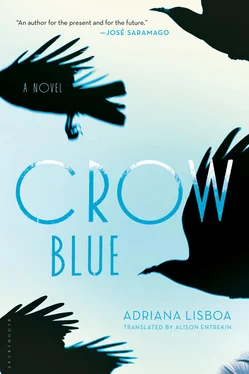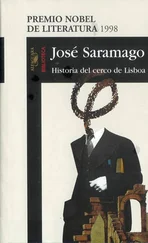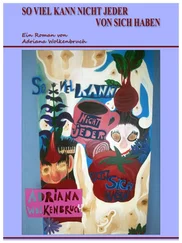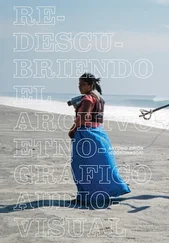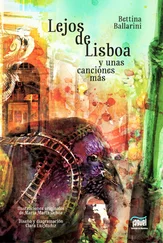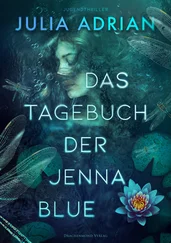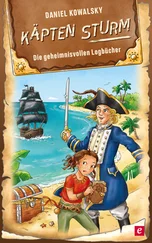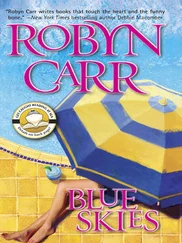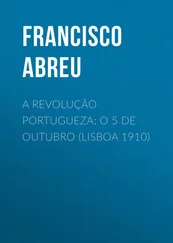I buried him, an ex-Fernando under the earth. And together with him, his ex-life and his ex-memories which, regardless of whether he shared them or not, would always be his alone and no one else’s. Which he felt in the forest, which he felt in the London pub, which he felt sliding over the frozen mud in Peking. Which he felt when he embraced Manuela/Joana, Suzana, Isabel. Which he felt before and after those embraces. When he deserted these women or was deserted by them ( to desert: to leave empty or alone, abandon, withdraw from; to forsake one’s duty or post with no intention of returning ). What he thought, what he planned and didn’t do, what he promised and didn’t deliver, what he did without any foreplanning, what he didn’t hope for and got anyway.
A little over a year ago Carlos’s parents moved to Florida, where Dolores, their disgraced runaway daughter, had become a prodigal daughter who kept twin cars with HIS (XO) and HERS (XO) license plates in her garage in Tallahassee. The sex of the cars causes a certain discomfort, I imagine, when Dolores’s father and his moustache need to go out and only HERS is in the garage. Dolores’s mother doesn’t drive, so is spared any similar grief. But maybe the father has already bought himself a car with a regular license plate, with letters and numbers without meanings.
A little over a year ago Carlos crossed the street and came to live in this house, because he had promised never to leave Colorado or be far from me. So, while his parents got ready to move and sold furniture and bought one-way tickets to Florida, he got his things and transferred them here. He is a tall young man of eighteen. He still hasn’t been back to El Salvador. Sometimes he asks to borrow my car and goes up into the mountains, like any native, intimate with the earth, the climate and its sharp changes, lamenting the avalanche that killed two unwary tourists (but who told them to go? You don’t mess with the Rockies, he always says). I moved into the room that used to be Fernando’s and Carlos moved into mine and with these minor migrations we stayed.
Nick, my schoolmate, kissed me once at a party. It felt weird for the first fifteen seconds, then it didn’t. Our tongues got used to it, our teeth stopped being obstacles, and soon I wasn’t thinking about tongues or teeth, but about other things with a sudden, desperate urgency.
The next year his family moved, he left the school, and at some point he must have reconsidered his political ideas because I heard recently that he’d become a marine.
At the same party where Nick kissed me, I was hanging a little earlier with a group of three girls from school, and at one point I went to straighten one girl’s necklace and said I think it’s better like that, and she said I don’t need information from South America.
I remember her sweet, precise, scalpel-like voice. I don’t need information from South America.
When Nick kissed me, I almost asked what a kiss from South America tasted like. But it was an empty question. It was a fleeting question, on which I chose not to dwell.
I have seen my father a few times. I went to Abidjan to visit him and his family. We talked a little about my mother. Not much. Besides me, the two of them didn’t actually have much in common. Not even memories. I don’t think they had even missed each other. I went to visit him twice with tickets that Fernando bought for me and I stayed fifteen days each time. Daniel came here last year, on a business trip to the United States. We went out for a few beers. It was nice to go out for a few beers with my father. I paid the bill. He didn’t want to let me but I insisted and said that he was my guest and added, with a lack of originality that was possibly touching, that the next time we’d have dinner at a French restaurant and everything. From time to time we talk on the phone. From time to time I talk to Florence on the phone. The last time I could hear Norbert’s vacuum cleaner on the other end of the line. I never heard anything else about Isabel.
I have a job at the Denver Public Library — but not as a security guard. I sold Fernando’s 1985 Saab and bought a Saab fifteen years younger because I don’t know anything about cars and at least Saab was a familiar name. I’m not the talkative type. But people no longer hear an accent when I speak.
Would I have done things differently, if it were up to me — if I’d had choices, if I’d had a card deck of lives and could have chosen one instead of another? I would have. Not everything. I’d have changed just one detail, only one, at the end of a scene that took place over two decades ago.
My version would be like this:
The highways are an adventure in December in this part of the world. Fernando was on the road for much more than the usual six hours between cities on Interstate 25. There was snow and ice on the road. He left behind Trinidad, former residence of Bat Masterson and, in those days, the world sex change capital thanks to the operations conducted by the famous Dr. Stanley Biber. He passed a sign saying WELCOME TO NEW MEXICO LAND OF ENCHANTMENT and saw in his rear-view mirror a sign saying WELCOME TO COLORFUL COLORADO, with the Sangre de Cristo Mountains to the west.
When he arrived in Albuquerque I was in my room dreaming pint-sized dreams, dreams that were the size of my life, that fit easily through the bars of the crib. He and my mother embraced with the force of how deeply they missed one another. He went to bed with her. Later, after midnight, she made some soup and they sat in front of the Christmas tree to sip it.
It was supposed to be for good. And it was.
To the University of New Mexico, especially Professor David Richard Jones, and to the University of Texas in Austin, especially Professor Sonia Roncador. For the home away from home and help with my work, I thank Leila Lehnen, Jeremy Lehnen, Malcolm McNee and Erô Silva. I would also like to thank Taís Morais, Cristina Brayner and Giulia Gurevitz. And my agents Nicole Witt and Jonah Straus.
ALISON ENTREKIN’s translations include City of God by Paulo Lins, The Eternal Son by Cristovão Tezza, Near to the Wild Heart by Clarice Lispector and Budapest by Chico Buarque. She has translated short fiction for numerous anthologies and literary magazines, including short stories by Tatiana Salem Levy and Carola Saavedra for Granta 121: Best of Young Brazilian Novelists . She is a three-time finalist in the New South Wales Premier’s Translation Prize & PEN Medallion.
Brazilian author ADRIANA LISBOAwas born in Rio de Janeiro and currently resides in the United States. She has published eleven books, among which six novels, a collection of short stories and prose poetry, and books for children. Her work has been translated into English, French, Spanish, German, Italian, Swedish, Romanian and Serbian, and will shortly appear also in Arabic.
Among her honors are the José Saramago Prize for her novel Symphony in White , a Japan Foundation Fellowship for her novel Hut of Fallen Persimmons , a fellowship from the Brazilian National Library, and the Newcomer of the Year Award from the Brazilian section of IBBY (the International Board on Books for Young People) for her book of poetry for children, Língua de trapos ( A Tongue Made of Scraps ). In 2007, Hay Festival/Bogota World Book Capital selected her as one of the thirty-nine highest profile Latin American writers under the age of thirty-nine.
With degrees in Music and Literature, Adriana Lisboa performed as a Brazilian Jazz singer while living in France, and subsequently worked as a music teacher in Rio. She also translated into Portuguese such authors as Cormac McCarthy, Margaret Atwood, Jonathan Safran Foer, and Maurice Blanchot.
